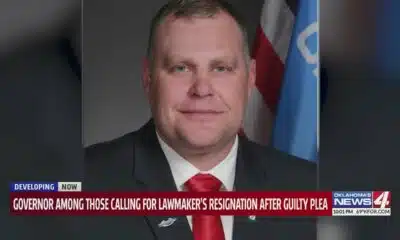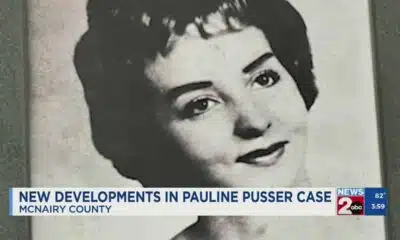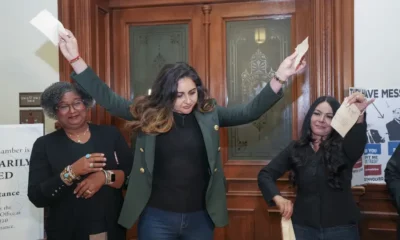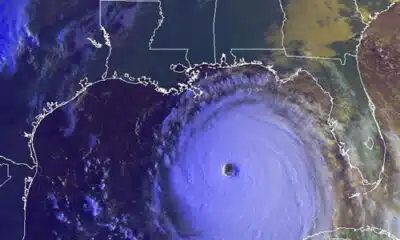News from the South - West Virginia News Feed
Pickup truck crashes into divider
SUMMARY: A pickup truck crashed into a divider in Barboursville, leading the West Virginia Division of Highways to shut down the westbound lanes and one eastbound lane to clean up the scene. Barboursville Fire Chief Andrew Frazier reported that crews had to clean up about 30 to 35 gallons of diesel fuel spilled during the crash. The barrier was repositioned, and after cleanup efforts, all lanes were reopened for the evening commute. Officials provided updates regarding the incident and its impact on traffic and safety in the area.
Pickup truck crashes into divider. For more Local News from WSAZ: https://www.wsaz.com/ For more YouTube Content: …
News from the South - West Virginia News Feed
Jay’s Evening Weather Friday 08/29/25
SUMMARY: Jay’s Evening Weather Friday 08/29/25: Tonight’s forecast for Oakill and Nicholas County looks pleasant for football Friday. Temperatures start around 70°F, dropping to the mid-60s by halftime and into the mid-50s by game’s end—bring a jacket or blanket. Traffic near New River Gorge Bridge is flowing well. Beckley reports 73°F with mostly cloudy skies and light north winds. Statewide temps range from 67°F in Wheeling to 82°F in Huntington. Dry air dominates, with only isolated showers expected Sunday mainly in southern Calfields and Pocahontas County. Overnight lows will be in the low 50s. The weekend starts dry, with rain chances increasing Sunday and Monday.
The week has been a dry one around southern West Virginia, but some showers and storms are in the forecast on Sunday and again toward the middle of next week.
FOR ALL THE LATEST, BE SURE TO FOLLOW US ON FACEBOOK AND TWITTER:
https://facebook.com/WOAYNewsWatch
https://twitter.com/WOAYNewsWatch
News from the South - West Virginia News Feed
Clay County Panthers face steep expectations in 2025
SUMMARY: The Clay County Panthers, fresh off a postseason appearance, face steep expectations in 2025. Led by an experienced head coach, the team looks to win over 20 games and advance deeper in the playoffs. Although their new turf field won’t be ready for week one, the Panthers are excited to be the first to play on it soon. Despite practicing at various locations, including a local baseball field and gym, the team remains motivated. Returning offensive linemen and a new quarterback have put in significant offseason work, fueling optimism for a strong and successful season ahead.
Out in Clay County, a team fresh off a post-season appearance is looking for more in 2025. FULL STORY: …
News from the South - West Virginia News Feed
Tribal radio stations wait on $9M pledged in congressional handshake deal
by Jennifer Shutt, West Virginia Watch
August 29, 2025
WASHINGTON — Tribal radio stations that are supposed to receive millions to fill the hole created when Congress eliminated funding for the Corporation for Public Broadcasting haven’t heard anything from the Trump administration about when it will send the money or how much in grants they’ll receive.
Unlike most government spending deals, the handshake agreement South Dakota Republican Sen. Mike Rounds negotiated with the White House budget director in exchange for Rounds’ vote on the rescissions bill wasn’t placed in the legislation, so it never became law.
Instead, Rounds is trusting the Trump administration to move $9.4 million in funding from an undisclosed account to more than two dozen tribal radio stations in rural areas of Alaska, Arizona, California, Colorado, Idaho, Minnesota, New Mexico, North Dakota, Oregon, South Dakota and Wisconsin that receive community service grants from the Corporation for Public Broadcasting.
But neither Rounds’ office, the Office of Management and Budget, nor the Bureau of Indian Affairs responded to emails from States Newsroom asking when the grants would be sent to those radio stations and whether the funding levels would be equal to what they currently receive.
Loris Taylor, president and CEO of Native Public Media, a network of more than 60 broadcast stations that’s headquartered in Arizona, said she’s written to Rounds and the Bureau of Indian Affairs about the handshake deal reached in July but hasn’t heard back.
“I can’t place my expectations on something that hasn’t been concretely shared with the stations,” Taylor said. “And so all I can say is that our expectations are to raise money for the stations to make sure that they have operational dollars for FY 2026, and that’s exactly where we’re placing our focus.”
Taylor pointed out that Rounds’ informal deal with White House budget director Russ Vought doesn’t cover all of the tribal stations in the network and will only last for one year, leaving questions about long-term budgeting.
An Interior Department spokesperson wrote in an email after this story originally published that “Indian Affairs has received a list of 37 stations and is working to distribute about $9.4 million in funding to support them.
“We know how important these stations are for public safety and are moving quickly to get the money out. Before we can set a timeline, we need to coordinate with the stations, tribes and other partners to ensure the funds are delivered efficiently and meet the needs of Indian Country. We will share updates when we have more to share publicly.”
The spokesperson did not provide a list of those stations or information on how the department plans to divvy up the funding.
‘The little stations like us’
Dave Patty, general manager at KIYU-FM in Galena, Alaska, said he isn’t planning to receive any federal funding during the upcoming fiscal year, in part because he hasn’t heard anything from the administration. The 2026 federal fiscal year begins on Oct. 1.
“Well, I certainly can’t budget anything that I don’t know is coming, so I’m definitely not planning for it now,” he said.
President Donald Trump and Republican lawmakers’ decision to eliminate all funding for the Corporation for Public Broadcasting because of their belief of left-leaning bias at National Public Radio wasn’t the right way to address those frustrations, Patty said.
“The narrative was definitely centered around NPR and that was definitely wrong because NPR aren’t the ones in trouble,” he said. “NPR is well funded from philanthropists all over the country, and as a mothership, NPR is not going anywhere. It’s the little stations like us that are going to go away because, for instance, about 60% of our budget came from the CPB grant.”
The Corporation for Public Broadcasting announced in early August it will shutter most of its operations by the end of September, with some staff working through January.
NPR and the Public Broadcasting Service have made no such announcements, but local stations throughout the country have announced budget cuts since Congress approved the bill rescinding $1.1 billion in funding it previously approved for CPB. That money was supposed to cover costs during fiscal 2026 and 2027.
Lawsuit feared
Karl Habeck, general manager at WOJB in Hayward, Wisconsin, said he’s only heard “gossip” and “rumors” about how exactly the handshake agreement will work in practice but is concerned that someone may challenge the Trump administration’s authority to move money around since it wasn’t in the bill and never became law.
“What gives them the right to take these funds that were allocated for environmental projects and send them towards Native American radio stations?” Habeck said.
Typically, the administration would need sign-off from appropriators in Congress before moving large sums of money from one account to another.
Officials haven’t said publicly where exactly they plan on taking the money from and it’s unclear if the Trump administration is trying to create a new account for grants to rural tribal radio stations out of thin air, without an actual appropriation from Congress.
Alaska Republican Sen. Lisa Murkowski, chairwoman of the Interior-Environment Appropriations Subcommittee, and Oregon Democratic Sen. Jeff Merkley, ranking member on the panel, didn’t immediately respond to a request for details.
Habeck said he expects WOJB will be okay financially for the next year, but that he and many others don’t know what the future will hold after that.
“It’s going to be hard,” Habeck said. “I guess people don’t understand. You know, they try to compare us to commercial radio and it’s two different things.”
Local broadcasting stations, he said, have fewer employees and are often a nexus for their communities, providing information about everything from lost dogs to emergency alerts to high school sports updates.
“That doesn’t happen everywhere. It’d be a shame to lose that,” Habeck said. “I think we’re an integral part of the community and people have come to rely on us and appreciate that. And I’m talking everybody. I don’t care what their political stance is. “
A different mission for tribal radio stations
Sue Matters, station manager at KWSO in Warm Springs, Oregon, said she reached out to one of her home-state senators, Ron Wyden, who contacted Rounds’ office to ask how the funding would be allocated and when. But Wyden was unable to share any concrete information.
Matters also spoke with someone she knows at the Bureau of Indian Affairs, who was similarly unable to provide information about how the agreement will actually work.
“I’m just assuming there’s not anything,” Matters said, adding she’s now focusing on securing a grant from the bridge fund that’s supposed to help the more at-risk public broadcasting stations.
Tribal stations, she said, often have substantially different missions than commercial stations, focusing on language and cultural programs as well as preserving their traditional life.
“That’s endangered,” Matters said. “We won’t let anything stop us. But it’s sad that for whatever reason this funding has been taken away.”
West Virginia Watch is part of States Newsroom, a nonprofit news network supported by grants and a coalition of donors as a 501c(3) public charity. West Virginia Watch maintains editorial independence. Contact Editor Leann Ray for questions: info@westvirginiawatch.com.
The post Tribal radio stations wait on $9M pledged in congressional handshake deal appeared first on westvirginiawatch.com
Note: The following A.I. based commentary is not part of the original article, reproduced above, but is offered in the hopes that it will promote greater media literacy and critical thinking, by making any potential bias more visible to the reader –Staff Editor.
Political Bias Rating: Center-Left
This content primarily focuses on the challenges faced by tribal radio stations due to funding cuts and uncertainties under a Trump-era Republican administration. It highlights criticism of the Trump administration’s handling of the Corporation for Public Broadcasting funding and emphasizes the negative impacts on vulnerable local and tribal communities. The article underscores the perceived inadequacies and lack of transparency in Republican-led funding decisions, with quotes reflecting concern about the consequences of defunding public media. The tone is critical of Republican actions while supportive of public and tribal media, which is characteristic of a center-left perspective. However, it remains factual and does not delve into broader partisan rhetoric, maintaining some level of balance and avoiding far-left ideological framing.
-
News from the South - Texas News Feed5 days ago
Racism Wrapped in Rural Warmth
-
News from the South - Texas News Feed7 days ago
DEA agents uncover 'torture chamber,' buried drugs and bones at Kentucky home
-
News from the South - Missouri News Feed6 days ago
Donors to private school voucher program removed from Missouri transparency site
-
News from the South - Tennessee News Feed2 days ago
New developments in Pauline Pusser case
-
News from the South - Florida News Feed7 days ago
Ukraine’s independence-era voices say Russia’s effort to keep control has lasted decades
-
News from the South - Texas News Feed6 days ago
Texas Democrats’ walkout prompts GOP retribution
-
News from the South - Alabama News Feed5 days ago
Child in north Alabama has measles, says Alabama Department of Public Health
-
Our Mississippi Home5 days ago
After the Winds: Kindness in Katrina’s Wake










































